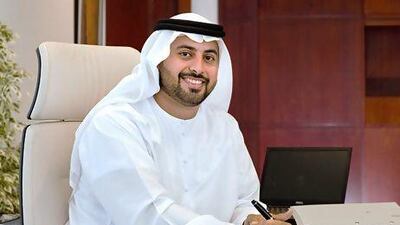As one of the new breed of corporate technocrats that has emerged from the Dubai financial crisis, Sheikh Maktoum bin Hasher Al Maktoum knows he has to concentrate on delivery.
"The worst is behind us, but there are still big challenges ahead. It all depends on the outcome," he says, in a rare media interview.
He was talking about Dubai, now embarking on a new plan for growth after the scare of the 2009 financial crisis. But he could just as easily have been talking about Shuaa, the region's oldest investment bank, of which he is the executive chairman.
He was parachuted into the Shuaa job some 18 months ago, after three years of losses had marred its reputation as one of the most prestigious financial institutions in the Arabian Gulf.
After a period of intense introspection at the 33-year-old bank, and some swingeing job cuts, in early October Sheikh Maktoum stood in front of an audience of Dubai's elite at the grand Godolphin Ballroom to proclaim the new strategy, and the way forward, for Shuaa.
Dubai Holding, a key stakeholder and owner of 48 per cent of Shuaa's shares, was represented among the audience. "At the presentation, I was conscious of the fact that a good plan can go wrong when only insiders understand it," he says. "A friend of mine said it was the worst speech he'd ever heard me deliver, but the people there were among the smartest in the world, and I think I got the point across."
The plan was a change of direction for Shuaa. From being an orthodox one-stop-shop investment bank, it will in future focus more on being a provider of credit, especially to small and medium enterprises.
"The mandate when I came in was to be profitable in 2012, and we could have done that if we'd sold the credit side, but we identified that as a core, profitable business and decided to grow it," says Sheikh Maktoum.
"Now we are pledged to make a profit by 2013. The range forecast is from a loss of Dh18 million [US$4.9m] to a profit of Dh6m, but we have to make a profit," he emphasises.
Sheikh Maktoum is not a banker by training or background, but the Shuaa job was recognition for his talents and as a "fixer".
His MBA in the United States was in restructuring, "so I gravitated naturally towards fixing things."
The first couple of ventures back in the UAE were rather more entrepreneurial. He helped to bring the Virgin Megastores brand into the country, then set up AI Grand Prix motor racing, subsequently sold for a multimillion dollar profit.
After some personal and profitable property dealing in the run-up to the global financial crisis, he says, "I took a bit of a sabbatical, and liquidated all my assets in July 2007."
Smart timing, but the extent of the crash of the following year was a shock. "As markets crashed I kept buying the Dow Jones index, at 10,000, then at 8,000. When it hit 6,000 I turned off the TV," he recalls.
He won his first job as a turnround specialist when he was asked to sort out the Al Fajer property business, which had fallen victim to the boom-and-bust in Dubai. Delayed properties were completed and delivered.
A different kind of challenge came with Al Nasr football club, whch had fallen on hard times.
"It was tough work … And football fans will tell you straight if you've got something wrong, in the stadium or the TV match analysis, " he says. He got the club into the top three of the UAE league.
Bringing Shuaa back to the big time is a different game. "Shuaa is coming back, we know the worst is behind us. Every quarter, no, every day is better than the last," he says.
"In our strategy, we haven't factored in any market upturn, so it's a robust plan."

